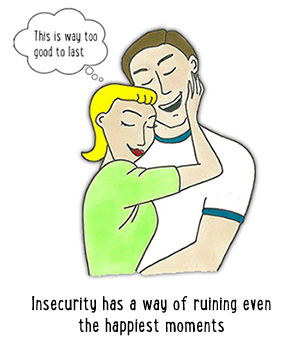Do You Have an Inferiority Complex?
How to spot and overcome an inferiority complex
 "Inferior? Or economically superior?" courtesy of jswieringa
"Inferior? Or economically superior?" courtesy of jswieringa"While one person hesitates because he feels inferior, another is busy making mistakes and becoming superior." ~ Henry C. Link
Most of us compare ourselves to others. Mass media beams in the finest looking, richest, and most talented people into our lives 24/7. This creates the illusion that we 'know' all these beautiful, clever, younger, athletic, rich, able people. Because we compare ourselves to people we know, this illusion of knowing air-brushed 'have-it-alls' can make us feel correspondingly worse about ourselves.
Eleanor Roosevelt: Making me feel bad about myself
The trouble is, we may compare ourselves unfavourably. Yes, I know Eleanor Roosevelt (bless her) suggested that no one can make us feel inferior unless we allow them to, but... oh, great! Now I feel inferior and it's my fault because I'm allowing it to happen. But seriously, Eleanor did have a point - feeling inferior is different from knowing you're inferior.
...What?
Superior inferiority
Check out the How to Boost Self-Esteem article for general tips on making you feel better about being you. Here I want to talk specifically about how we feel compared to other people.
An inferiority complex is a general feeling of not being 'up to the mark'. Now, I want to distinguish between knowing and feeling. I know I am inferior to Bill Gates financially, to Stephen Hawking intellectually, to millions of men aesthetically; but this knowledge doesn't bother me one iota. Knowing you're inferior in some ways is very different from feeling inferior.
Knowledge that you might sometimes compare unfavourably to others may just be insight and perception. It's crazy to try to pretend that we are all as good as each other in all ways. (The 'self-esteem industry' has been guilty of this ridiculous artifice.)
An inferiority complex is not the same as confidently accepting that others have the edge on you in some areas. True destructive feelings of inferiority happen even when we might (objectively) be better than others but feel somehow worse. For example, I worked with a man who got the best degree in his class at Cambridge University, yet still felt academically inferior to his fellow students. The way he felt about himself was a total misrepresentation of the reality. Why do people suffer from inferiority complex?
Anatomy of the inferiority complex
Confidently knowing that Usain Bolt can run faster than you can is not the same as feeling inferior. True inferiority complex has us feeling:
- We should be as good as others.
- We are not as good as others, but we don't really know why that is; a generalized feeling of inadequacy not based on rational judgements.
In a world in which we are on the one hand encouraged to buy stuff because we're "worth it" whilst simultaneously being force-fed airbrushed perfection, it's easy for someone with a pre-existing inferiority complex to feel worse.
It might be you were repeatedly told you weren't good enough by a parent (one woman I know was repeatedly told by her mother she was the "ugliest girl in the street" and no one liked her). Some people were constantly compared to other people: "Why can't you be more like your sister!" Other people feel inferior because they are perfectionists and feel that anything less than perfection is inadequate.
Whatever the reasons for inferiority complex, here are a few ideas to help.
1) Get specific
As I said, we can know we're inferior in some ways. If you find yourself feeling inferior, ask yourself: "Okay, exactly who do I feel inferior to?" Narrow it down.
Emotional thinking is always sloppy, so tighten it up to make it less emotional. There are close to seven billion people on this planet (last time I counted). What kind of person do you feel inferior to? Rich people? Good looking people? Very academic people? People you view as accomplished? Most people aren't these things.
Now get even more specific; name names to yourself. "Actually, I feel inferior to Bob down the street." Why? How, specifically, is Bob better than you?
So from 'feeling inferior' we've gone to 'feeling inferior to specific types' to 'feeling inferior to Bob down the street'. Now ask yourself in what ways Bob isn't superior to you. Does he have your humility? Wit? Life experience? If we are too narrow with what constitutes 'good' or 'successful', then we're more likely to come off feeling worse. Believe me, 'Bob' has issues of his own.
2) Drop the mime
No one has written on his tombstone: "Here lies Ralph; he was quite like Bob." All Ralph can be is Ralph (or the best possible version of himself); he ain't ever gonna be Bob. Wanting to be someone else is okay(ish) when you're fifteen. But how can an impersonator ever be true to themselves? Being inspired by someone else means assimilating some of their traits into who you are. It doesn't mean trying to have their exact same life.
Inferiority complexes thrive on people wanting to be someone they're not. This doesn't mean we have to limit ourselves as to what we can do, but it does mean that we can get by much better when we don't try to be someone else.
3) Dare to be different
Life is much less restrictive now in westernized counties. In the '50s, you were expected to be married (perhaps in your early twenties); to have kids and a 'respectable career' (grave robbers need not apply); to have short hair or longer hair, depending on gender; to dress 'properly' and have all the right opinions. We haven't cast aside all these norms and I'm not suggesting they are all bad, but people are much freer now to live a bit differently.
No one is a 'failure' if they are unmarried at forty (or eighty), or if they don't have kids or a traditionally professional career. Not in terms of current societal norms; though your parents may still have these retrospective expectations which may have influenced you. But the kind of thinking that prompts: "Oh no! I'm forty-five now. I should have a mortgage, a partner, 2.4 children! I should be like how other people are!" is a trap. If you really want these things, that's one thing; but if you only feel they are expected of you, then remember that your life can only really be lived by you.
4) What would make you feel as good as others?
Recall that in Hans Christian Anderson's tale 'The Ugly Duckling', the young swan felt a failure as a duckling because, well, it wasn't really a duckling, was it? How could it be a successful something that it was not?
If you feel inferior, imagine for a moment how you'd need to be to not feel inferior. What would you need to look like, to own, to be doing? Now reflect: Would all of that really be you? Or would it be like a swan posing as a duck?
5) Beware utopian thinking
People who feel inferior tend to think in 'all or nothing' ways (any emotion will drive us to do this). 'Utopianism' is a type of this simplified emotional thinking. It's a kind of 'if only' thought.
- "If only my nose was straighter... then I'd be confident and happy!"
- "If only I earned ten thousand more a year... then my life would be good!"
- "If only I could be exactly the same as Bob... then I'd feel great about my/himself!"
Life doesn't work like that. Because much of what we feel inferior about is relatively superficial; the non-superficial part of us will always feel left wanting by external band-aid remedies. Sure, you might have more confidence with a straighter nose for a while, but you are much more likely to forget about comparing yourself to others (either favourably or unfavourably) when you live your life in a sustainable way that utilizes your real core character strengths, values, and personal ideas.
As the explorer and translator Sir Richard Burton wrote:
Do what thy manhood bids thee do, from none but self expect applause;
He noblest lives and noblest dies who makes and keeps his self-made laws.
10 Steps to Solid Self Esteem course
Vanquish that critical inner voice and discover how much easier and happier life is with healthy levels of self esteem...








